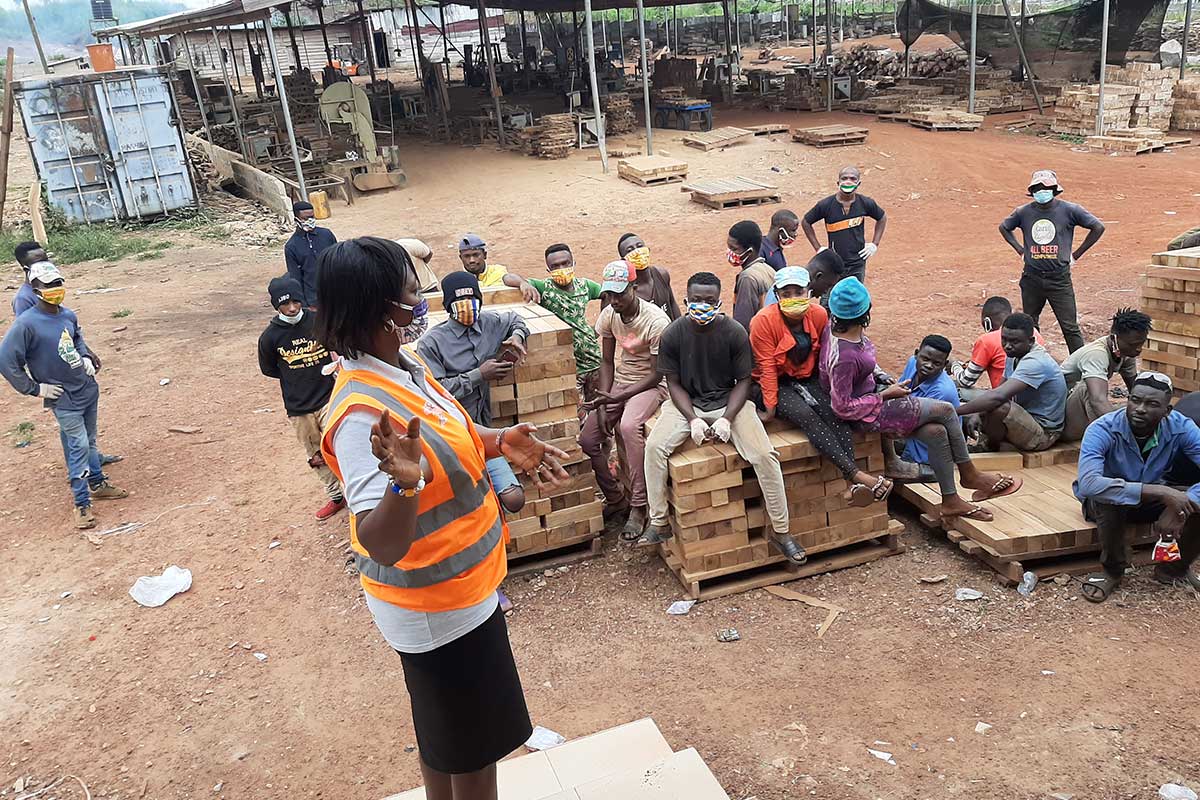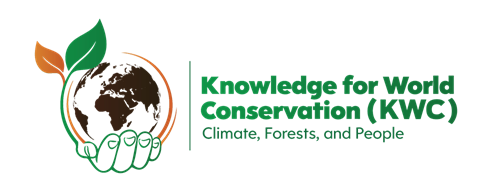
Knowledge for World Conservation - KWCGH is a not-for-profit organization that supports and undertakes forest and environmental related activities and projects that promote sustainable forest management, climate change adaptation and environmental protection.
Together with our extensive network of partners and collaborators, including Government institutions, Environmental NGOs, businesses, associations and special interest groups within the forest and related natural resource sectors, we develop innovative solutions to major local, regional and global challenges that catalyze change and growth in forestry businesses.
KWC advances its strategic priority of positioning Ghanaian Small and Medium Forest Enterprises (SMFEs) through services that ensure better forest management, compliance with standards pertaining to legal wood trade and certification (including VPA/FLEGT Process), adoption of cutting edge management and technical skills.
The SMFEs form a huge economic constituency within the Ghanaian forest sector hence their influence and impact cannot be overemphasized. KWC believes that the key to achieving sustainable forest management, climate change adaptation and environmental protection begins with considering and addressing needs and issues facing SMFEs in the sector, hence our strategic priority.
The Organization is registered under the Laws of Ghana and is currently headquartered in Kumasi, Ghana.
Our Objectives

KWC’s goal is to support the efforts of small-medium forest enterprises (SMFEs) utilizing wood removed in ways that maintain or restore forest health and fulfill social obligations and to create markets for their products.

Our Vision

That the sustainable and profitable functioning and development of Small-Medium Forest-based Enterprises in Ghana shall be guaranteed by effective and efficient utilization of resources available to them.
Our Mission

To promote partnership that supports environmentally-sound economic development of Small and Medium Forest Enterprises (SMFEs).
Our Goal

To support the efforts of small-medium forest enterprises (SMFEs) utilizing wood removed in ways that maintain or restore forest health and fulfill social obligations and to create markets for their products.
Our Values

Advocacy through Involvement
KWC works with stakeholders in the forestry sector at many levels; from the local to global, from the communities and SMFEs to decision-makers. We believe the best way to achieve positive change is for operators of SMFEs and communities in particular to be involved in the decisions that affect them.
Insight and Identifying solutions
We also work with stakeholders to put across practical solutions to the problems that cause forest resources degradation in general. We go to the depths of the challenges, providing clear and credible analysis of the connections between political, economic, environmental and social systems that undermine the availability and sustainability of the forest resources.
Inspiration and motivation
We act as catalyst for change and motivate SMFEs and forest fringe communities to collaborate/work with us and to take action for them.
Independence and Integrity
We are trustworthy, accountable, and transparent and resist any influence from political, religious, government agency or business interest. Our Integrity, credibility and team work is vital to our success.
Our History

The timber value chain trajectory pursued under the Ghana Economic Recovery Programs in the 1990s emphasized on value addition to timber products for international and domestic markets expansion for their obvious benefits to the socio-economic development of the country.
During the period, diverse collaborative technical support programs including the Dutch Centre for the Promotion of Imports from Developing Countries (CBI), the Timber Industry Development Division (TIDD), the USAID Trade and Investment programmes assisted timber products exporters in obtaining sustainable positions on the European and American markets.
To achieve this objective, selected companies received technical assistance to meet the requirements of the market, export marketing training and eventually were given the opportunity to present themselves at international Trade Fairs in Europe and the USA. The programme also informed participating companies about developments in the field of forest and timber certification and to offered assistance to the companies in obtaining certification.
For long term benefits capacities being built for beneficiary companies, six firms that participated in a CBI-sponsored Market Development training and were introduced to the concept of Clustering as a means of creating the critical mass for SMEs to enter and retain their positions on the export market affirmed their belief in the concept and decided to form the Kumasi Wood Cluster (KWC) to promote their business objectives. KWC was formed to coordinate and collaborate the efforts of the partners in overcoming the raw material, environmental pressure and marketing challenges that the situation presented is posing to their businesses.
KWC was thus formed as an association of small and medium companies and registered as a Company Limited by Guarantee. KWC membership was open to concession/TUC holders, and manufacturers of wood products (lumber, veneer, plywood, mouldings, furniture, and carvings among others) and members sourcing raw material from the forest committed themselves to the practice of responsible and sustainable forestry as a requirement.
On 7th February 2005, KWC was inaugurated in Kumasi with an initial membership of six Small and Medium Forest Enterprises; Bibiani Logging and Lumber Company Limited (BLLC), Sunstex Company Limited (SCL), Poku Transport Sawmill Limited (PTS), Ehwia Wood Products Limited (EWPL), Subri Industrial Plantations Limited (SIPL) and SKOD Company Limited.
Besides forest management and controlled wood and chain of custody certification, KWC has now diversified its scope of activities and programmes to undertake other forest and environmental related projects especially with the VPA/FLEGT Process in Ghana, all geared towards sustainable forest management, climate change adaptation and environmental protection.
Projects being undertaken by KWC cover training of private companies in support of FLEGT implementation and the adoption of Sustainable Forest Management (SFM) practices; providing technical support to SMFEs to achieve FSC certification; educating and sensitising forest fringe communities (m/f) on forest governance and sustainable collection of Non Timber Forest Products (NTFPs), which offers an important alternate means of supporting livelihoods.
KWC has also supported the development of TUC area Management Plans for SMFEs, providing training to build capacities of forest stakeholders (including women) to implement TLAS in Ghana including development of procedures, manuals, templates for training SMFEs towards FLEGT licensing; and facilitating reforms in trade association governance and functions. KWC is lending support to the building of strong associations both in Ghana and the West Africa sub region.
